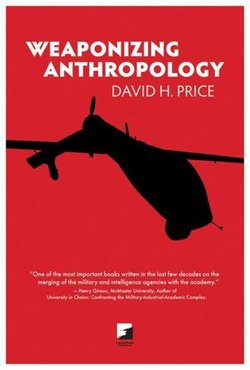Weaponizing Anthropology

Реклама. ООО «ЛитРес», ИНН: 7719571260.
Оглавление
David H. Price. Weaponizing Anthropology
Отрывок из книги
For Laura Nader, who teaches anthropologists to study up and confront power; and who taught me that critics have to work harder than those aligned with power.
Just as it was becoming passé to remark on anthropology’s status as colonialism’s wanton stepchild, George Bush’s Terror War rediscovered old militarized uses for culture, and invigorated new modernist dreams of harnessing anthropology and culture for the domination of others. Because I began in the early 1990s using the Freedom of Information Act, interviews, and archival research to document American anthropologists’ interactions with military and intelligence agencies, by the time the post-9/11 push by the Pentagon and CIA to again use anthropological knowledge as tools for intelligence, warfare and counterinsurgency, I had a decent head start on documenting and thinking about some of this history. By the time America got its terror war on, I had already documented the details of how this worked in the past, and had thought about the core of the ethical, political and theoretical fundamentals of a critical approach to questions relating to the weaponization of anthropology.
.....
As a direct result of its members’ experiences in World War II, in 1948 the Society for Applied Anthropology articulated the first formalized American anthropological code of ethics. This code stressed that the “anthropologist must take responsibility for the effects of his recommendations, never maintaining that he is merely a technician unconcerned with the ends toward which his applied scientific skills are directed” (Mead et al. 1949:20). It stated that, “the applied anthropologist should recognize a special responsibility to use his skill in such a way as to prevent any occurrence which will set in motion a train of events which involves irreversible losses of health or the loss of life to individuals or groups or irreversible damage to the natural productivity of the physical environment” (Mead et al. 1949:21).
It was no accident that it was the applied anthropologists’ professional society, and not the larger, highly academic AAA, that first developed an ethics code. The experiences and traumas of the Second World War forced these anthropologists to take a hard look at what had been and what could be done with their work. The war also left many anthropologists concluding that the military frequently did not listen to their analysis because it went against the institutional assumptions of the agencies which sought their advice. During the war, the academic journal of the AAA continued to publish articles about obscure kinship systems and carry on lofty theoretical debates, but Applied Anthropology carried articles detailing the logistics of imprisoning Japanese Americans, wartime labor issues, and forms of social engineering in service of the war, and once the guns of war fell silent those who had been drawn into contributing anthropology so directly to this fight started thinking hard about what it all meant, and what limits should exist.
.....